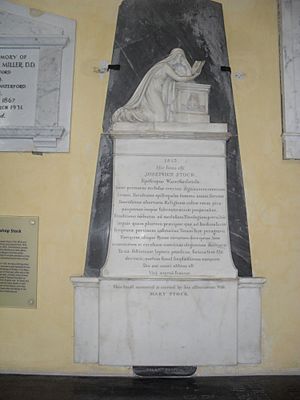Joseph Stock (bishop) facts for kids
Joseph Stock (1740–1813) was an important Irish church leader and writer. He served as a bishop of Killala and Achonry and later as bishop of Waterford and Lismore. He is remembered for his writings, especially his account of being captured by French soldiers during a rebellion in Ireland.
Contents
Joseph Stock's Early Life and Career
Joseph Stock was born in Dublin, Ireland, on December 22, 1740. His father, Luke Stock, was a hosier (someone who sold socks and stockings). Joseph went to school in Dublin and then studied at Trinity College Dublin, a famous university. He was a very bright student, becoming a Scholar in 1759 and graduating in 1761. He even became a Fellow of the college in 1763, which meant he was a senior member of the academic staff.
After becoming a priest, Stock worked in the church parish of Conwall in the diocese of Raphoe. In 1793, he became a church official called a prebendary in Lismore. He left this role in 1795 to become the headmaster of Portora Royal School.
Captured During the Irish Rebellion
In January 1798, Joseph Stock became the Bishop of Killala and Achonry. Soon after, while he was visiting Killala Castle, a surprising event happened. The French army, led by General Jean Joseph Amable Humbert, landed in Ireland. They came to support the Irish Rebellion of 1798 against British rule.
Bishop Stock found himself a prisoner of the French forces. His sons were also briefly captured when they went out to see the French ships. He kept a diary of his experiences during this time. This diary gives us a unique look at what happened during the rebellion from his point of view.
Later Life and Legacy
In 1810, Bishop Stock was moved to the Diocese of Waterford and Lismore. He passed away in Waterford on August 13, 1813. His memorial, a special stone, can be found in Waterford Cathedral. It was created by an artist named James Tyley.
Joseph Stock's Writings
Joseph Stock was known for being very smart. He was good at classical languages like Latin and Greek, and he knew a lot about many different subjects.
- In 1776, he wrote a book about George Berkeley, a famous philosopher. This book was important because it was based on information from people who knew Berkeley.
- He also wrote about his experiences as a prisoner of the French army. He kept a private diary from August 23 to September 15, 1798. Parts of this diary were later printed in a book about the rebellion.
- In 1799, he published a more complete story called Narrative of what passed at Killala in the Summer of 1798. By an Eyewitness. This book described the French invasion of County Mayo. People said his book was very fair and balanced, which some believed slowed down his career advancement.
Stock also published school versions of works by ancient writers like Tacitus and Demosthenes. He wrote many articles about religious topics of his time. He left behind two handwritten books of letters, which are kept at Trinity College, Dublin. These letters were mostly written to his son Henry between 1806 and 1813.
Joseph Stock's Family
Joseph Stock was married twice. With his first wife, Catherine Palmer, he had ten children. One of his most well-known children was Joseph Stock, who became a Member of Parliament (MP) for Cashel. In 1795, just ten weeks after his first wife passed away, he married a widow named Mary Obins.
 | Toni Morrison |
 | Barack Obama |
 | Martin Luther King Jr. |
 | Ralph Bunche |


